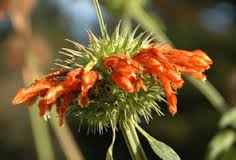Weather sayings can be quite colorful. Some of them may be connected to scientific observations, while others are more superstitious in nature. What the weather will do this month can change on a moment’s notice. March is definitely one of the more unpredictable months. One week the temperatures are warm and spring-like. A few days later the weather turns stormy and cold. Depending on the groundhog you follow, spring will be here, or not, in the next few weeks.
But, any long time Northwest Florida residents knows, summer will be here eventually and it is going to get hot and dry. So, while trying to figure out whether to wear your T-shirt or arctic parka today, take a moment to locate that patch of the landscape and consider adding a “lion” or “lamb.”
 Lion’s ear and Lamb’s ear are two plants that survive under hot, dry conditions. Lion’s ear, Leonotis nepetifolia, is a tall-growing (8 feet) annual with orange tubular flowers that peek out of the spiny bloom head, giving the appearance of a lion’s ear. Hummingbirds reportedly hover next to a flower or even perch on a cluster, drinking for 10 seconds or longer. That’s an eternity in hummer world and about as long as any lion would tolerate someone messing with his ears.
Lion’s ear and Lamb’s ear are two plants that survive under hot, dry conditions. Lion’s ear, Leonotis nepetifolia, is a tall-growing (8 feet) annual with orange tubular flowers that peek out of the spiny bloom head, giving the appearance of a lion’s ear. Hummingbirds reportedly hover next to a flower or even perch on a cluster, drinking for 10 seconds or longer. That’s an eternity in hummer world and about as long as any lion would tolerate someone messing with his ears.
Lamb’s ear, Stachys byzantina, is an easy care perennial with wooly gray-green leaves and lavender colored flower spikes. It makes an attractive accent in a container or excellent groundcover that invites you to experience its soft “wool”, like those cute little ears of a baby sheep.
Both of these plants are self-sustaining species that establish well in open dry areas. The lion’s ear must self sow seed to return each year. Whereas, the lamb’s ear will return from the roots and can be divides if you want to relocate them.
Lion or lamb, March is a good time to plan for easy care, summer, blooming flowers. While it may be “freezing” now, you know once it gets hot, the last place you will want to be is outside in the blazing sun. Maybe the thoughts will warm you. For information on good perennials for Northwest Florida go to: http://edis.ifas.ufl.edu/mg035
- What is Titi? - March 22, 2024
- Taking Care of the Plants Inside - February 8, 2024
- Celebrate Trees in January - January 4, 2024
